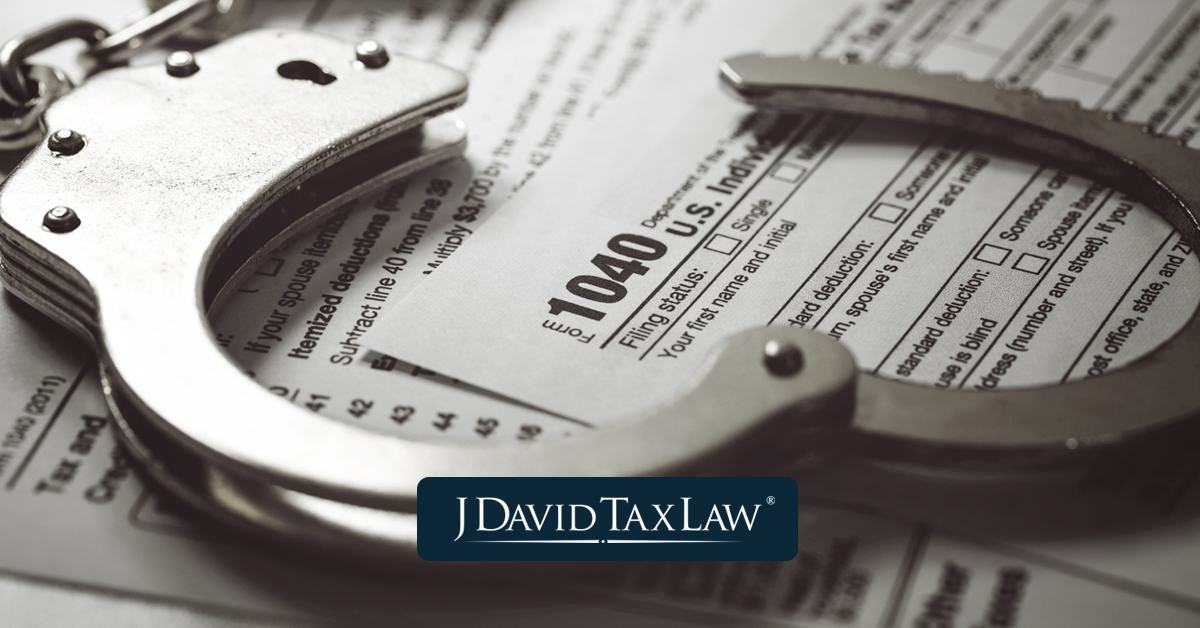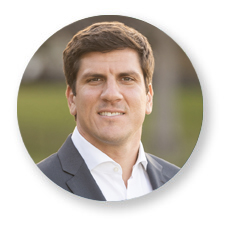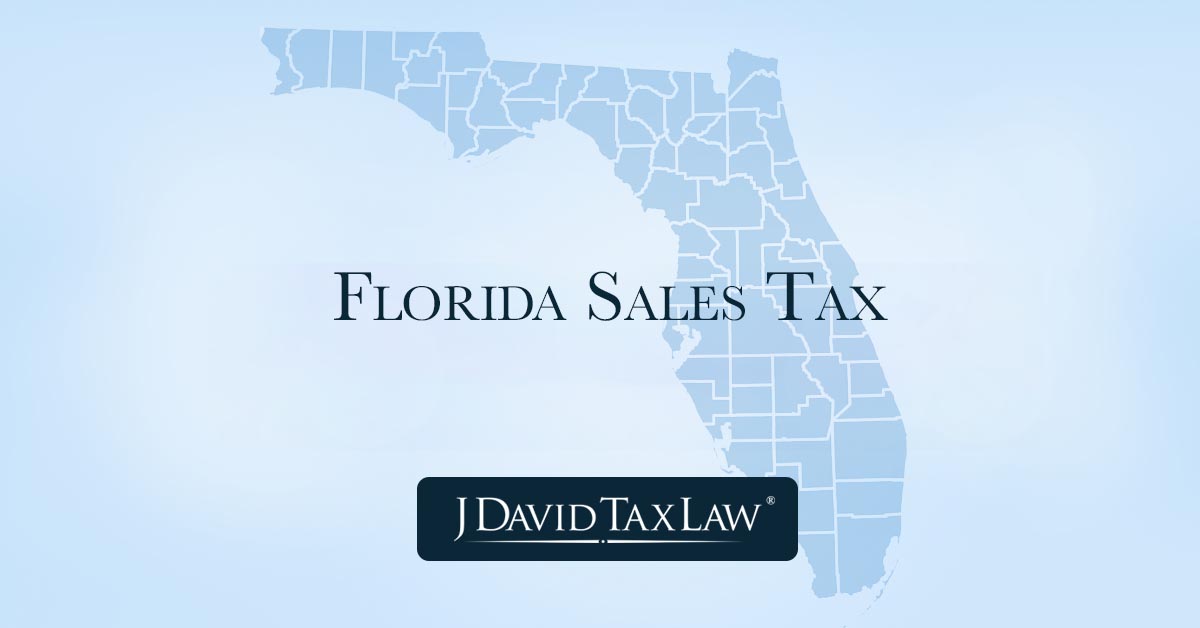IRS Criminal Prosecutions: 2021 Top 10

IRS Criminal Prosecutions: 2021 Top 10
During our no-cost consultations, J David Tax Law in Tampa, FL receives the same question every week: Does the IRS and State tax agencies ever pursue criminal charges, and will they put people in jail for tax crimes? The answer is a resounding, YES. The good news, during 2021 alone, we estimate that our experienced criminal tax attorneys were able to keep 81 clients from serving jail time for tax evasion, tax fraud, and failure to pay sales tax.
The IRS prosecuted thousands of criminal tax cases with a 91% conviction rate during 2021. Through their investigation of potential criminal violations of the Internal Revenue Code and related financial crimes, the IRS Criminal Investigation (CI) division serves the American public in a way that encourages compliance with the law and fosters confidence in the tax system.
The IRS-CI is the criminal investigations arm of the IRS. It is the division that conducts financial crime investigations, including tax fraud, identity theft, healthcare fraud, money-laundering, narcotics trafficking, public corruption, and more. The IRS-CI special agents are the only federal law enforcement agents that have investigative jurisdiction over Internal Revenue Code violations, and they have a nearly 90 percent federal conviction rate.
A segment of criminal tax cases arises from ordinary civil audits and that may be frightening to learn. When an IRS auditor uncovers suspicious activity during a civil audit, the auditor will notify the IRS’s Criminal Investigation Division without you knowing and the IRS has no obligation to tell you that a criminal referral has occurred. In reality, for the majority of cases, the civil auditors will often suspend the audit without any explanation. You may be pleased, thinking the audit is over, or at least on pause and hopefully, it will not resume. At the same time, the IRS quietly begins to build a criminal case against you, which is how a criminal investigation comes from an IRS audit.
This list features the top 10 IRS Criminal Prosecutions of 2021
10. Albuquerque couple will serve federal prison in the Ayudando Guardians case. Because they stole funds from Ayudando Guardians Inc., Susan Harris and William Harris were sentenced to 47 and 15 years in federal prison, respectively. A nonprofit organization for hundreds of people with special needs, Ayudando Guardians Inc. provides guardianship, conservatorship and financial management.
9. Rochester man sentenced to prison and will pay millions for his role in a Ponzi scheme bilking millions from investors. John Piccarreto Jr. is convicted of filing a false tax return and conspiracy to commit mail fraud. He obtained money through an investment fraud Ponzi scheme by conspiring with others. He was sentenced to 84 months in federal prison and ordered to pay $19,842,613.66 in restitution.
8. Two Orlando sisters sentenced to prison in $25 million tax fraud scheme. Petra Gomez along with her sister and co-conspirator, Jakeline Lumucso, were sentenced to eight and four years in federal prison, respectively. During 2012 to 2016, they operated a tax preparation business from five locations in central Florida, and they filed over 16,000 false tax returns for clients which came to a total of $25 million in losses to the IRS.
7. Russian bank founder sentenced for evading exit tax after renouncing U.S. citizenship. Oleg Tinkov, aka Oleg Tinkoff, will pay more than $248 million in taxes and was sentenced to time-served and one year of supervised release. He was charged with renouncing his U.S. citizenship and attempting to conceal large stock gains that should have been reported to the IRS when the company he founded became a multibillion dollar, publicly traded company.
6. Ontario man responsible for a multimillion-dollar unlicensed bitcoin exchange sentenced to 3 years in federal prison. For running his unlicensed Bitcoin business that was responsible for at least $13 million in Bitcoin and cash exchanges, often for drug traffickers, Hugo Sergio Mejia is sentenced to three years in federal prison and will forfeit all assets gained. In an attempt to mask his true activity, he established multiple companies and charged commissions for the transactions.
5. Bitcoin exchange owner is sentenced to prison for money laundering. A Bulgarian National, Rossen G. Iossifov, was sentenced to 121 months in federal prison. Using popular online auction and sales websites — including eBay and Craigslist — he participated in a scheme where he falsely advertised high-cost goods that did not exist, typically vehicles. Upon receipt of payment for the goods from the victims, the conspiracy became a complicated money laundering scheme where US associates would accept funds from the victims, convert the funds to cryptocurrency, and then transfer the cryptocurrency to money launderers in other countries.
4. Ex-Orange County church pastor sentenced to federal prison for his role in $33 million con to defraud investors. After he orchestrated a church-based investment scam which defrauded investors of $33 million, the ex-pastor of the Church of the Health Self, Kent R.E. Whitney, will serve 14 years in federal prison and will pay $22.66 million in restitution to victims. With the goal of luring investors to invest in church entities, church representatives were directed to appear on television and during live seminars to make misleading and false claims. Victim funds totaling over $33 million of went to the church and they were given fabricated monthly statements to reassure them their funds were being invested, when in actuality, barely any money was ever invested.
3. Prairie Village Man will Serve 12 Year Prison Sentence in $7.3 Million Payday Loan Fraud, $8 Million Tax Evasion Case. For selling false information or fictitious debts to payday loan businesses, Joel Tucker will serve 12 years and six months in federal prison and he will pay the IRS over $8 million in restitution. He also failed to file his federal tax returns with the IRS – for himself and his businesses – for multiple years.
2. DC Solar owner was sentenced to 30 years in federal prison for billion dollar Ponzi scheme. California-based DC Solar owner, Jeff Carpoff, forfeits $120 million in assets to the U.S. government for victim restitution and he is sentenced to 30 years in federal prison. He created a Ponzi-scheme that sold thousands of manufactured mobile solar generator units (MSGs) that never existed. He committed account and lease revenue fraud while the proceeds were used by him to purchase a sports team, luxury vehicles, a NASCAR team, and real estate.
1. San Fernando Valley family members get prison sentence for fraudulently obtaining tens of millions of COVID relief dollars. For crimes ranging from aggravated identity theft to bank and wire fraud, the Ayvazyan family received sentences ranging from 10 months of probation to 17.5 years in prison. The family used stolen and fictitious identities to submit 150 fraudulent applications with phony payroll records and tax documents to the Small Business Administration for COVID-relief funds. They used the funds to purchase gold coins, luxury homes, jewelry, designer handbags, and more. Cutting their ankle monitoring devices, Richard Ayvazyan and his wife Terabelian absconded prior to their hearing; they are fugitives currently.
Our Criminal Tax Attorneys & Tax Fraud Lawyers in Tampa, FL Can Help You
If you are under threat of being investigated by the IRS or State of Florida for criminal tax behaviors, contact J. David Tax Law in Tampa, FL today for a no-cost consultation. Without the proper legal representation, DO NOT give a statement to the IRS or the State of Florida or other State tax agencies.
Categories
Featured Articles

Meet Jonathan David Sooriash
He is the founder and Managing Partner of J. David Tax Law®. He is the winner of the 2019 Ultimate Tax Attorney awarded by the Jacksonville Business Journal. This award recognizes law firms and attorneys who show exemplary professional talent and skill while demonstrating superior client care, leadership, charitable concern, and civic engagement. Jonathan graduated from Chapman University School of Law. He has practiced law since 2011.









